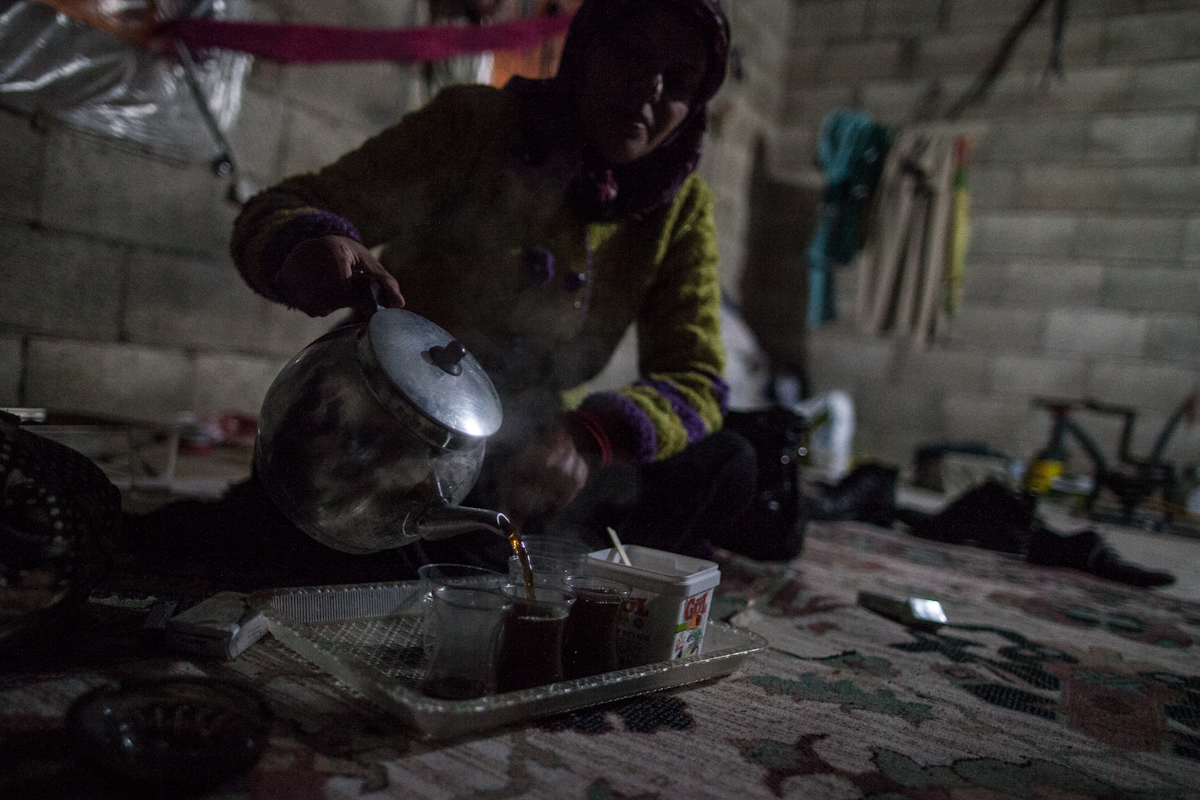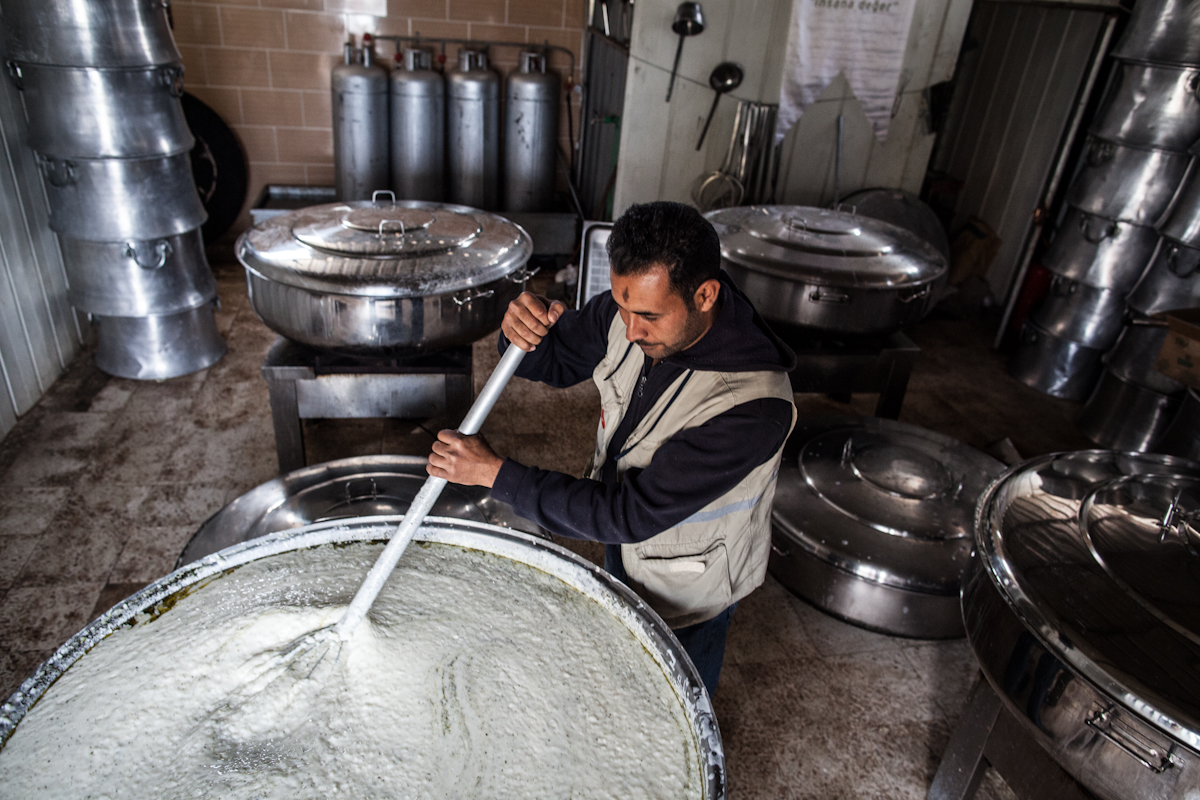
All Photos by Gary Lobevich
My conversation with Mrs. and Mr. Alsellah is now into its second hour, yet until now I’ve missed what seems to be the key to comprehending what they’re saying — the expression in their daughter’s eyes. Eight-year-old Farida is warily watching the surroundings, trying to remain hidden behind her father’s back. Her fearful eyes appear to have been scarred by the images of wartime violence and her powerless parents forced to flee home.
The family is no longer in Syria, and Farida is said to be much calmer these days. However, nights bring back the memories of the wartime Aleppo from which they escaped. Nightmares can be triggered by almost anything.
Recently, there was a party here in one of the grey, one-story concrete houses that make up the poor district of Reyhanli, a town of 60,000 in southernmost Turkey, just a few kilometers from the Syrian border. The air briefly filled with loud music and excited, young voices. Farida kept waking up throughout the night.
“Why the noise?”
“It’s nothing, go back to bed.”
“Why can’t they stop?”
“Please lie down. Please try falling asleep.”
Farida’s six-year-old sister, Safija, lay next to her on a mattress, equally terrified. Unlike Farida, she remained silent – her eyes wide open with fear.
When President Bashar al-Assad responded to popular protests across Syria with a military offensive in March 2011, over 1 million Syrians fled the country. Nearly one-third of those who were displaced found refuge in one of a dozen camps in Turkey. Reyhanli, with its proximity to the Syrian border and a large Arab population, became an important sanctuary for Syrian refugees.
Those already here try to help the newcomers in their search for housing and work, providing whatever basic commodities they can spare. Farida’s family entered the southern part of Turkey in mid-December. The rents had all raised with the influx of displaced Syrians, so the Alsellahs could only afford a place where plastic sheets serve as windows. An old mesh bed frame, with twisted springs hanging on a few spare nails, now serves as a door to Farida’s flat.
One of the many things the family particularly misses is psychological help for their two daughters. Like thousands of other Syrian children, both Farida and Safija suffer from post-traumatic stress disorder. The condition emerged as a combination of apathy mixed with hypersensitivity, the inability to sleep, fear and panic attacks.
But after hearing a family friend talk about the benefits of acting – something he himself had heard from a psychologist before the war – Mr. Alsellah came up with the idea of starting an amateur theater in Reyhanli. The goal was simple: break up the cycle of war memories by capturing children’s attention with short, humorous scenes. The costumes – like people's everyday clothes – would be simple, even sparse. But combined in the most unusual manner, they would help transform the little actors into princesses, wise noblemen and deceitful servants.
The Healing Power of Theater
It’s late in the afternoon and the large room is not just full of children, but also a solemn atmosphere of concentration. Although the young spectators come here frequently and readily, it is difficult to make them smile.
The show is a simple play of improvised sketches based on classic themes taken from Arabic literature. Far more important than the plot is the interaction between the children. In a dim light directed at the “scene,” justice triumphs over wickedness. When wickedness finally flees – making the most improbable expressions on the way – the hall finally bursts with laughter. This is the most important part of the evening: quiet witnesses transformed into participants full of energy. The laughter connects and provides strength. It brings freedom to those affected by the war. It creates an invisible army, more powerful than the military parades. It helps to overturn dictators.
Farida smiles on her way out. This positive improvement is – so far – always temporary.
Traveling on, I arrive at another refugee camp in A’zaz (Syria) just after 10am. The inhabitants here live in a state of a limbo. Unable to return to homes that are now most likely to be destroyed, they nevertheless cannot escape from Syria, lacking the necessary documents to cross the Turkish border. As their wait continues, the place has slowly transformed from a few thousand tents into a faithful copy of a typical Arab town. Its bustle slowly comes to a standstill in the overpowering heat of midday.
There are signs of normality here. As I walk towards the camp’s center, I pass a few tents turned into stalls filled with cigarettes and sweets. In another, a hairdresser is carefully attending his next customer.
The tents’ interiors are in impeccable order. Old men lay on symmetrically-positioned mattresses, contemplating the whiteness of the fabric above them — white being the symbol of mourning in Islam. Women tirelessly sweep away the sand brought by the wind. They have an impressive determination to introduce some order to this alien surrounding: to make the place their own.
There is also a hospital here, where Dr. Bara’a Al Nasser receives over one hundred patients a day, most of them children. “We’re running short on everything – antibiotics, painkillers, even aspirin,” he says with resignation.
In addition, A’zaz also has a school, along with some after-school activities and even a psychologist. Three large military tents, subdivided into classes by sheets of white fabric, serve as the classrooms. A couple of the tents are decorated with drawings. Tanks, warplanes and fleeing people have all been carefully depicted by child artists. For the children, war is a natural part of their world. It is hard to say whether this helps to cope with the painful reality.
30 year-old Muhamed teaches English here. He admits there is little he can do to improve the situation, but is determined to continue despite having only one book, a noisy road outside, and sweltering temperatures topping 40 degrees Celsius (100 degrees Fahrenheit).
Nevertheless, the classes are well attended. A large group of boys (girls are taught separately) start to sing in English. It is Queen’s “We Will Rock You,” but with new lyrics. The song asks, “What is the most important thing in life?" The answer comes in the chorus: “We want, we want freedom!” Intrigued students from other parts of the school peer through the fabric walls and then join in, clapping rhythmically, their hands high up in the air.
Millions of similar hands will at some point reach up to tear down the photographs of Bashar al-Assad. To pull the ropes tied around the statues of his father, ending once and for all the era of the family’s rule. Perhaps some singing here will be among those involved in the struggle? And maybe they’ll recall the words of their old teacher: “We want, we want freedom!”
Want to see more? Click here it see the photo gallery with the rest of the images by Gary Lobevich
3 WAYS TO SHOW YOUR SUPPORT
- Log in to post comments















